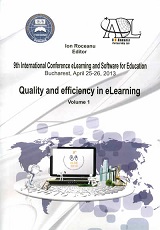A RETHINKING OF ASSESSMENT IN OPEN AND DISTANCE EDUCATION
A RETHINKING OF ASSESSMENT IN OPEN AND DISTANCE EDUCATION
Author(s): Carmen Maria ChişiuSubject(s): Education
Published by: Carol I National Defence University Publishing House
Keywords: rethinking; self-evaluation; partner student; formative assessment; assessment for learning source; participatory evaluation
Summary/Abstract: In an open and distance education the environment is that of e-learning type. One of the distinguishing materials away from the classic study is the systematic use of applications that can be used as evidence of self, as examination papers or assessment tests. They assess the procurement, the training skills covered by the unit concerned. In distance learning, teachers meet in the main role of evaluators of student achievement. They have a duty to provide competent answers to their questions and comment, to motivate the individual to work prepared and submitted verification of students. Rethinking the evaluation of teaching lies in the need to tackle this task in terms of education centering on student's interests and availability. It is the answer to the need of improving the quality of education by engaging students as partners in their own development, by emphasizing practical skills, applied learning, increasing motivation for learning. This paper proposes a rethinking of IDD evaluationoriented aspects: 1. Assessment approach as a source of learning and opportunity; 2. Considering students through self-assessment, partners in their own development; 3. The use of methods and techniques and practical formative role-applied; 4. Self realization by students based on a set of criteria designed by the teacher. Participatory evaluation, consensual, is based on shared responsibility between student and teacher. The emphasis on cooperation, collaboration and learning process. Student, as an appraiser, learns to know and builds their own learning. Stimulated activism and involvement, both in learning and in the assessment. In addition to rethinking evaluation, this paper presents the conclusions drawn from the analysis of responses to a questionnaire and direct observation of the 212 students assessed using the assessment methods proposed.
Journal: Conference proceedings of »eLearning and Software for Education« (eLSE)
- Issue Year: 9/2013
- Issue No: 01
- Page Range: 226-231
- Page Count: 6
- Language: English

